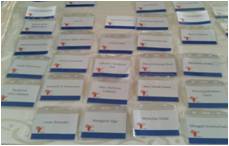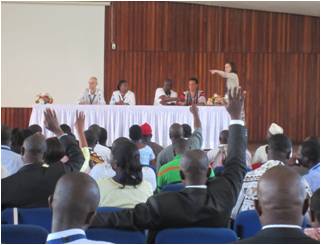Guest blog by Pablo de Castro, GrandIR, speaker at Open Access Africa
2011
 The first Open Access Africa conference, which was held
The first Open Access Africa conference, which was held
in November 2010 at Jomo Kenyatta University in Nairobi, was originally planned
to be a one-time event. However, the enthusiasm and insistent calls by conference
attendees to hold further Open Access Africa conference editions resulted in the
second Open Access Africa being
scheduled from October 25-26 2011 at the Kwame Nkrumah University of Science
and Technology (KNUST) in Kumasi, Ghana. The conference, organized
by BioMed Central, aimed to bring together researchers, librarians and funding
bodies from within and outside of Africa to discuss the benefits of open access
publishing in an African context.
The number of attendees at Open Access Africa events keeps increasing; at
this year’s event more than 150 representatives from various African countries including
Ghana, Nigeria, Kenya, Ethiopia and Sudan were in attendance at KNUST to listen to the talks on different open
access-related subjects.
A large number of presentations regarding open access projects and initiatives
being presently carried out in Africa were held at the recent event, such as the UN Economic Commission for
were held at the recent event, such as the UN Economic Commission for
Africa (ECA) Institutional Repository, launched
last May in Addis Ababa (presented by Irene Onyancha, UNECA Chief Librarian),
promotion of open access availability of case reports (by Joseph Ana, British Medical
Journal West Africa), KNUST open access
Institutional Repository (Helena Assamoah-Hassan, KNUST Library) and the OASCIR Project for setting up the first Sudanese Institutional Repository (Pablo de
Castro, GrandIR). However, the Open Access Africa 2011 talks had a somewhat wider
scope, with presentations such as those by Google Ghana or mPedigree, a successful Ghanaian startup for fighting drug counterfeiting in
Africa, going beyond open access into specific technological application
initiatives; arising a remarkable interest along the round table held right after
the talks.
On day one at the event, Deborah Kahn, Publishing Director at BioMed Central,
had offered an overview of open access in developing countries. She
showed how connectivity is gradually improving in Africa
and how that gives way to other issues such as access to computers and computer
skills, research funding, research literature, skills to write research papers
and where to publish research works. The
Open Access Africa 2011 conference was a very good opportunity for discussing
all these issues, with Mathew Harvey from Department for International
Development (DFID) providing the funders’ viewpoint, Edanz
introducing support programmes for English
language research paper editing and Gladys Muhunyo, Director of Computer Aid Kenya, describing their intensive work for supplying low-cost
technology to partners in many African countries.
There was also a lively interest from local media to reflect the
scientific event being held at KNUST, and interviews with Carrie Calder, BioMed
Central Head of Marketing and Digital Sales, were performed as a result at Focus FM and by a local TV
station.
 There was also an Open Access Africa 2011 poster section, in which
There was also an Open Access Africa 2011 poster section, in which
initiatives such as EU FP7 Africa Build Project, aiming to
build a research and educational infrastructure for Africa, or the Nigerian experience at developing Open Access, by Oluwatoyosi Owoeye from the College of Medicine at University of
Lagos, were featured.
Finally, the EIFL-funded OASCIR Project for setting up the first Institutional Repository in Sudan attracted
much attention due to the fact that it was a direct result from the Open Access
Africa 2010 conference. Dr. Rania M. H. Baleela, Assistant Professor at the
Department of Zoology, Faculty of Sciences, University of Khartoum and myself,
then a member of the e-archivo Institutional Repository team at Carlos III
University Madrid, first met at Open Access Africa 2010 and had extensive
discussions on how to foster open access initiatives and Institutional Repositories
in African countries. An agreement for future cooperation came out of those
talks, as a result of which GrandIR startup was founded in Madrid in December 2010, so that when the EIFL funding call
arrived in February 2011 for supporting open access advocacy campaigns in
developing countries, they were able to quickly put together and submit a
proposal (the OASCIR Project) for setting up the Open Access SCientific Institutional Repository
at the Faculty of Science U of K. Both Rania and I are very proud of our achievements
and want to thank BioMed Central for the invitation to be able to present the
project at the Open Access Africa 2011 conference, such a successful platform
for promoting open access in countries like Sudan where no Institutional
Repository existed before. The OASCIR project was well under way exactly one
year after the project was born as a concept. It would be very good news if other
successful cooperation projects among different institutions in and outside
Africa were born from the Open Access Africa 2011 conference in Kumasi this
year and could be presented as success stories next year at Open Access Africa 2012.
One Comment